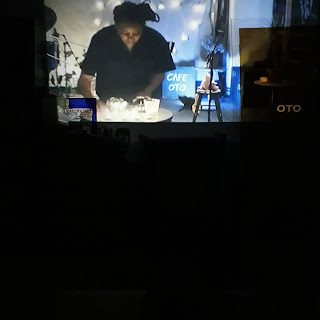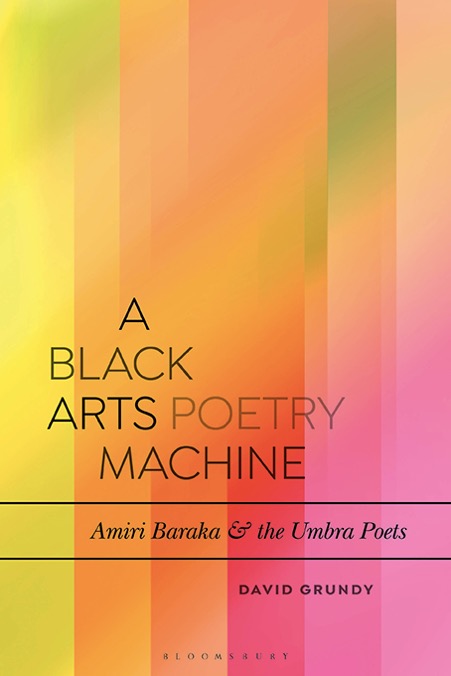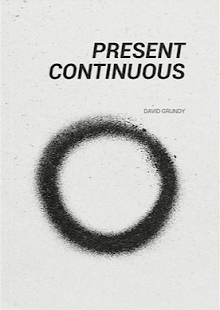
March 2020 has moved incredibly quickly, for reasons of which anyone reading this will be all too aware. Likewise, this will be no doubt littered with typos and overly-elongated sentences: perhaps others share this feeling that there is right now too much to say, all at once, and, simultaneously, that one feels numbed to not being able to say anything at all, overtaken by events, swept up in them, left behind. Yet at the same time, things have ground to a weirdly atemporal standstill, with all the glacial suddenness of what seems to be an imminent world historical leap: the treading of a fine line, a balance (though hardly balanced), between slivers of hope—that the current cruelty of economic and “social” arrangement might collapse, and that in its place agitation for transformed notions of social justice might emerge—and premonitions of horror and catastrophe, as the atomisation of social life reduces the possibilities for collective action and agitation, sharpens the knife edge that so many without the luxury of a comfortable “day-to-day” already face. This process exists on every level, from local to international to global. There's the chaos—the most noisily and easily-trumpeted—into which even the wealthiest of Western powers are plunged: powers whose arrogance assumed this could never happen, and thus made and (failed to) deploy utterly inadequate containment measures. Then, and inseparable from this, are the global inequalities by which, for the West, pandemic is always “elsewhere”—othered, racialised—and by which those who suffer the most and are the most at risk, those who are sacrificed on the pyre, those who are rendered expendable and peripheral, are always those who are already othered, racialised, those who, pandemic or no pandemic, are pushed to the mere brink of survivable life. London—where the UK government’s incompetent and disastrous laissez-faire refusal to act, followed by abrupt about-faces and the ever-present risk of authoritarianism, has allowed a high and sudden spread in cases, caught between “business-as-usual” (economic flow over human life) and war-footing “Blitz spirit” measures—is an uncertain place in the lately-woken spring sun.
Maybe it seems either callous or more important than ever—or both, or neither—to focus on music in this instance. But I’ll do so anyway. Since the earlier announcement of “social distancing” measures—in which the population seemed to temporarily took the lead over a government which briefly flirted with the absurd notion of “herd immunity” as (non)containment strategy—Café Oto switched its usual roster of gigs to a series of livestreams, in which musicians performed to an empty venue, broadcast on the web. Tuesday’s was the first I’d managed to catch, and just as the livestream began, the UK government announced what—in the often disastrous confusion that’s typified the governmental response to the increasing spread of the Covid outbreak over the past few weeks—seemed to amount to a full-on lockdown (police presence, trips outside rationed, most businesses closed—all with unclear provision for those on precarious contracts, with no fixed abode, and for all the various reasons that the cosy option of “working from home” is hardly an option for many). So this would be the last of these livestreams (now archived online: https://www.cafeoto.co.uk/archive/), the announcement exacerbating the already eerie fragility of two solo sets to a split and invisible audience (for it’s the coming together—to borrow Rzewski’s title—of audience that makes the socius of such music as much as it is the coming together of musicians, and as much as that coming together can occur across temporal and physical spaces, via recordings, scores and the like). That announcement also threatened to overwhelm the music, and I found it hard to focus on Kerry Yong’s performance of the first three of Messiaen’s Catalogue d’Oiseuax, fine though the performance was. Instead, all I could notice really were physical details: Yong acting as his own page-turner, moving the sheets on top of the piano—as if, like Igor Levit, he were giving the recital from his own living room—the way Yong’s hands seemed to glide with a kind of serenity down the keyboard even as he was actually executing some of the more tricky of Messiaen’s trilled avian notation-fantasias. Or maybe this was just a function of the inevitably glitchy nature of the livestream format, by the fact that, for the past few days of house-bound distancing, when I open the window all I hear is birdsong and building work and sirens and I’m not sure if silence or noise is more reason for alarm.
The second half was originally billed as Elaine Mitchener with bassist Neil Charles—who gave a superlative performance as part of Anthony Braxton’s Standards Quartet at Oto a few months ago, when all this seemed barely a blink in anyone’s eye—but ended up being Mitchener solo. For at least an hour, Mitchener crooned, howled, answered back, debated, channeled, chattered, dug deep and floored things in a solo vocal display astonishing not just for its virtuosity—Mitchener has Cathy Berberian levels of wild skill—but for what that virtuosity enabled her to do. This was emotionally heightened by the official announcement, and by all the uncertainty of the previous weeks, and of the weeks or months to come. Mitchener seemed to take that uncertainty in and on, to fully inhabit it, making it a ground from which to begin, while also offering the rock-like comfort against it. This comfort, this alternative, is something already central to Mitchener's music-making. By this I mean an alternative mode of temporality, which has two elements. Firstly, a total openness and ability to move within the moment—improvisational capacity, expressively buoyed by a variety of physical movement and gesture that responds to / echoes / drives the sound. Secondly, the aim to suggest, or even inhabit, alternative temporalities—cosmic, spiritual, non-Wester—the lyrics of Sun Ra, their afro-Futurist refusal of the killing constraints of presentness through projections into (imagined) past and (imagined) future, their atopic utopianism which is, of course, more material than any of the capitalist realist lies we’re daily told even as they break/thrive under the pressure of crisis. That’s an imprecise way of rendering what, in the experiential necessity Mitchener’s vocal work demands of performer and listener alike, is absolutely clear. You can stop reading and just click below if you want to know what I mean.
Mitchener began wordless, voiceless, lighting a bag of cheap candles (tea-lights, right?) on one of Oto’s signature tables, ringing a service bell every time one was lit. I wondered if it was a ritual for the dead—as Mitchener has previously memorialised the victims of criminal negligence in Grenfell Tower—so, here, those who have died so far of the virus, or perhaps those to come—or if that was placing too much symbolic freight on it, or if, as prelude and ritual, it was something that existed as a space deliberately open to interpretation: an entering in. Moving to the microphone, Mitchener began the recital’s musicked part with words that only after a minute or so made themselves manifest as decipherable words—stretched, distorted, chopped by their staggered speech-sung emergence, like a voice that’s trying to get out but at the same time trying to hide, operating within contradictory impulses, and it’s only from such contradiction that the full soar of sung note, of melisma or melody, can emerge; must be earned. The words, as far as I can tell, pertained to (a particular interpretation of) ancient Egyptian mythology—”the focus of oneness in time and space”.
Ra is the first principle which emerges out of the Primeval Waters. He is the subtle, singular principle of Creation, the focus of oneness in time and space. The Primeval Ocean itself transcends time and space and is beyond existence and non-existence. Ra is the first principle to emerge out of the Absolute (as Ra-Tem). His emergence signifies the beginning of existence
Point from which creation begins, as Oliver Lake put it—a singular principle that is yet subtle, the beginning of existence yet itself somewhere in between realms. It’s easy to metaphorize this:creation as a point which is not a point in time or space but refuses those categories, yet which maintains a necessary cohesion akin to that of any creative being; creation recreated every time we add to it through human activity. So in a sense that fragmented phrase—in Mitchener’s rendition, removed from origin, emerging in barely decipherable form (and decipherment only working backwards, as one stitches together a word from a syllable, a syllable from a string of notes, etc)—serves as another way of entering in, another statement of purpose, but also a statement of elsewhere, not as escapism, not as evasion of the moment where we are—for the rest of the performance channeled that with a ferocious and necessary intensity—but as the opening up of alternatives to the (mis)management of death in which our lives, more than ever, are now variously and unequally entwined.
The rest of the ‘recital’ passed in something of a blur, though it was beautifully precise, moving through a series of demarcated and holistically-constructed pieces, as Mitchener removed each page from her music stand (whether scores of simply words / prompts, I wasn't sure, and it didn't seem to matter), laying them on the floor. About half-way through, some Sun Ra lyrics appeared, as well as some pieces from Mitchener’s “sings the Black Avant Garde“ project, in which vocal pieces from ‘free jazz’ repertoire are treated as occasions for recital, given the seriousness they deserve as compositions, in the processing restoring the presence of the voice (particularly the gendered female voice) to free jazz, in which it is essential (Linda Sharrock! Patty Waters! Jeanne Lee! June Tyson!), but from which it is too often excluded. Remembered in no particular order, the other pieces included Archie Shepp and Jeanne Lee’s “There is a Balm in Gilead”, one of the great recordings of the 1960s, no doubt, Mitchener here echoing not only Lee’s own relatively un-extemporized renditions of the melody, but also the counter-melodies by Shepp’s tenor saxophone and Lester Bowie’s ghostly trumpet. There were Ra lyrics, removed from their original melody and rendered more tonally abstract, to the accompaniment of a shaker. There was an echo of classic Berberian-esque performance-art/avant-garde ‘New Music’ theatre featuring a trio of squeaky toys (a doll, a pig, and a long-necked rubber chicken)—more extraordinary here than the seriousness with which Mitchener treated these as instruments, the refusal to play for laughs or excess, was the fact that she managed to pull this off. Another pieec (perhaps the second), which began as a kind of spoken dialogue, of interpellation, hailing and refusal, sometimes seeming to touch on the present moment—spectres of people hoarding food and fighting in supermarket, as Mitchener listed various ingredients and foodstuffs—and in which voice’s internalised and externalised, inherently dialogic nature, could be tracked not only in the range of sound Mitchener produced—closer to Phil Minton or Maggie Nicols than Lee or Berbarian here—but in the viscerally expressive gestures by which she slapped, caressed, and framed her face and body; gestures of balancing and centering, of falling way and apart, holding the music in and letting it, letting oneself collapse but keeping it all together. Towards the end, Yong, who'd been sitting the whole time at the piano to the right of the stage area, silent and observant, briefly joined, with some brief rumbles of strummed piano strings; but it was Mitchener alone who ended things with an utterly devastating rendition of ‘Amazing Grace’. Written by a slaver-turned-abolitionist, the piece of course transcends its nature as white guilt-exculpation and religious apologia (Newton’s spiritual conversion predating by some years his ceasing to participate in the slave trade) to become a vehicle for libration, sung on Civil Rights marches by Fannie Lou Hamer, Mahalia Jackson and others—as Judy Collins put it, “to give magical protection – a charm to ward off danger, an incantation to the angels of heaven to descend”. So that history, the felt presence of the melody as something so familiar most of the audience could probably sing it—something Mitchener half-jokingly suggested when she said “sing along if you like”—but very quickly Mitchener, her live vocals dragging behind I think two or three voices of pre-recorded, multi-tracked rendition a la the phased unison/separation of Feldman’s ‘Three Voices‘, swayed a long ways from the familiar melody, her live line more and more hanging behind the pre-recordings and progressively omitting words, consonants, articulation in an elongated slur, so that the final round of the tune’s familiar contour essentially lacked either the melody or words except as sounds in the memory. As this process occurred, Mitchener sunk lower and lower to the floor, and closer and closer in to herself, the world around kept out—in its mendacity—yet allowed in—as something like Collins’s protective spell—for those who need it. "I was not sure the magic worked outside the church walls ... in the open air of Mississippi", noted Collins. "But I wasn’t taking any chance". Likewise today: who knows if such spells work. Who knows what that would mean. But I just want to register for now the strength in vulnerability of this performance as exemplary, as gift, benediction, and the rest: both a farewell to past certainties and a beginning to a situation we’re only, really, beginning to contemplate.









